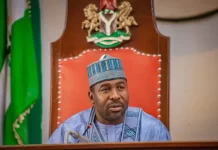As naira crashes in value, BDC operators say they are “studying the situation”
Bureau De Change operators who were banned from trading forex by the Central Bank have yet to issue an official press release in response to the ban.
The apex bank took a hard stance against forex dealers as the CBN Governor, Godwin Emefiele, announced the discontinuation of allocation of foreign exchange to Bureau De Change (BDC) operators, accusing them of engaging in unwholesome and illegal practices as well as being agents that facilitate money laundering, graft and corruption in the country.

Less than 24 hours after the CBN moved against the BDCs for those alleged forex infractions, the volatility of the naira against the dollar appears to have continued unabated as the market quickly responded to the new policies.
By now, the Association of Bureau De Change Operators (ABCON), the strong cabal of forex dealers would have issued a statement explaining their own side of the accusation.
However, Nairametrics reached out to top officials of the association to get their opinion on the ban and if there was any action being planned by the association. The response has been rather contrite.
A top member of the association who uncharacteristically chose anonymity said that they are “studying the situation and laying low at the moment to watch events as they unfold while they gather opinions on the matter.
He described CBN’s action as “very administrative” adding that the association ‘is consulting’ and would be having its council meeting next week to come up with their position on the matter.
He also said that the CBN with its allegation against members of the association ‘was generalizing the criminal tendencies’ of some of them. We also reliably gathered that the leaders of the association are currently in discussion with the CBN to find ways to resolve the debacle.

Some forex dealers told Nairametrics that the Naira depreciated against the dollar earlier in the day due to panic buying citing scarcity as another major factor. An operator who preferred to be named Yahaya said that he bought a dollar for N515 and was selling at N525.
He, however, said that the rate increase did not last long as it started to appreciate in the evening to N505/$1 if you want to sell dollar to them and about N510 if you want to buy from them.
He said that they would have to continue sourcing their forex from the black market and those international travellers who wished to sell to them. He also accused some of the BDC owners of allegedly selling the allocation from CBN at very high rates outside that recommended by the apex bank.
Another dealer, Suleiman said that they bought dollar at N510 to a dollar and sold at N520 to a dollar adding that the feelers he is getting is that the leaders of ABCON are hoping to have a meeting with the CBN.

A BDC license owner who does not want to be quoted said that the CBN does not really know where the issue is. He denied that most members of the association were involved in money laundering and said that the N2 margin recommended by the CBN is too low.
He said that the major problem is the scarcity of forex and the CBN does not have enough dollars to fund the foreign exchange market adding that he does not see the banks doing a better job.
One member complained about the limited quantity of dollars being sold to them by the central bank as a major reason for some of the bad practices that have led to this ban. For example, from giving BDCs $20,000 daily down to $20,000 weekly, margins from turnover of operators dropped, forcing them to seek liquidity from other sources at parallel market rates.
This inevitably leads to forex fungibility as both official and alternative sources are sold at black market rates. Some operators also lament that the ban will effectively lead to loss of jobs as BDC operators employ an average of 3 staff which when multiplied by 3,500 will lead to about 10,500 job losses.
Yesterday, operators admitted complicity among members of the association who constantly flout central bank regulations. This they also blamed on artificial control of supply and demand introduced by the central bank.

For example, when CBN limits inflow and outflow of forex through official channels, Nigerians seek alternative channels to sell their forex.
“This situation will continue to degenerate until the central bank resolves the liquidity constraints,” one trader lamented.



![[BREAKING] SYLVESTER OROMONI: LAGOS ORDERS INDEFINITE CLOSURE OF DOWEN COLLEGE ~ Fame News](https://www.famenewsonline.com/wp-content/uploads/2021/12/dowen-218x150.jpg)





























![EFCC LAYS SIEGE TO ARREST YAHAYA BELLO IN ABUJA [VIDEO]](https://www.famenewsonline.com/wp-content/uploads/2022/04/Governor-Yahaya-Bello--218x150.jpg)







